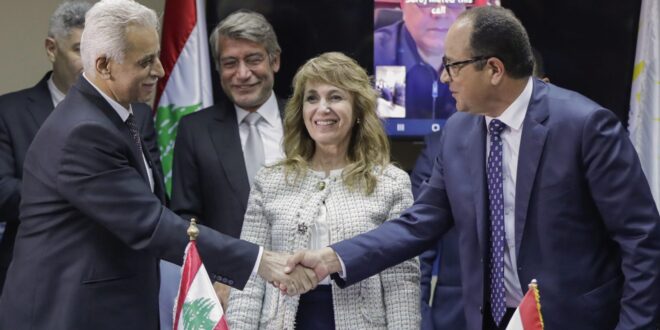Only days after the Lebanese Prime Minister Nagib Mikati announced that his country could expel Syrian refugees, as the economic hardship there made it impossible to “keep welcoming them,” Lebanon, Syria and Egypt signed a gas flow agreement. According to the official agency SANA, the deal allows the pumping and transporting of natural gas to Lebanon, a country struck by a multitude of crises, from Egypt via Syria and Jordan. It provides for the transfer of 650 million cubic meters of gas annually to the Deir Ammar power plant in Lebanon. Walid Fayyad, the Lebanese Minister of Energy and Water, said in a press conference that “the signing of the agreement is the culmination of the tireless seven months of work carried out by the three countries, which made it an example of Arab cooperation. “ He also thanked Syria for all the facilities provided to secure the mutual benefit of the two countries.
Syria set to gain
In fact, Syria is set to benefit substantially from the signature of the agreement. According to the opposition website Shaam Network, a report by the Jusoor Center for Studies sheds light on the agreement. First, because the regime is expected to actually benefit from an estimated 8% share –a small amount that could slightly improve the state of Syria’s electricity grid, which may not exceed half an hour of additional daily feeding. However, the regime’s greatest benefit comes in the context of cooperation with its surroundings and breaking its isolation from the penal code imposed on it. It may find an important outlet for its return to the consideration of other projects compatible with the regional framework and the interests of the major powers in the region, according to Jusoor for studies.
The Lebanese website al-Modon even said that talks in Syria focus on the benefit that the regime will gain from the agreement to transfer Egyptian gas to Lebanon through it.
The website said that the regime’s gains from the agreement seem to go beyond economic calculations. Assad’s biggest gain is not economic but is instead the breach in the wall of his isolation.“The regime is likely to direct this electricity to large projects, which are productive in supporting its foreign currency treasury,” Economist Khaled al-Turkawi told al-Modon In the context of exporting the agreement as a new victory over the sanctions approach, regime sources spoke of the need for Washington to remove the Syrian Gas Company (based in Homs) from the sanctions list. The World Bank will not start financing procedures without this requirement, to ensure that it is not subjected to U.S. sanctions. But it seems that the United States will not make such a move easily. The American Al-Hurra channel quoted a State Department spokeswoman as saying that Washington “has not, nor will it lift or waive sanctions against Assad and his regime until real and lasting progress is made toward a political solution.” She added that the United States “opposes reconstruction in Syria under the current circumstances.”
Indeed, the implementation of the project requires Egypt, Jordan, and Lebanon to obtain an exception from the United States to deal with the Syrian regime in energy issues related to the project. This may actually take place, with the State Department confirming that more assurances will be given to those countries, which may be in the form of a memorandum or official announcement from the Treasury Department’s Office of Foreign Assets Control.
Last week, senior adviser for energy security at the State Department Amos Hochstein visited Lebanon as part of the U.S. efforts to mediate a maritime border demarcation deal between Lebanon and Israel. In fact, as Israel started to exploit the disputed Karish gas well, Lebanon found itself in a precarious position that left it prone to concessions: Beirut has in fact agreed to give up entirely on Karish, in exchange for full control over the Qana field. According to the pan-Arab al-Monitor, Hochstein then announced that the Biden administration had given “pre-approval” for the project. Once the deal is finalized, “I believe we will be in a place where we can say it doesn’t violate the Caesar sanctions and have the gas finally flow,” he said.
 Eurasia Press & News
Eurasia Press & News




